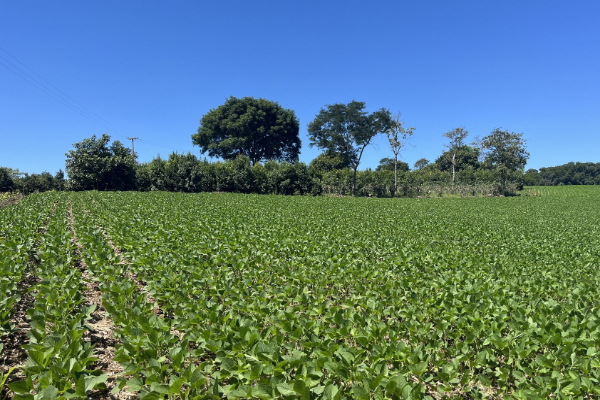Co-creation project to explore sustainable farming practices on soybean farms

Brazil is the world’s largest producer of soybeans. Recognizing the importance of sustainability, Solidaridad and BASF want to address challenges, enhance biodiversity and drive positive change. Photo: BASF
BASF and Solidaridad have partnered to understand how sustainable farming activities can have an increased effect on biodiversity, environmental conservation and the coexistence of agriculture and pollinators like bees. The project will be conducted within a network of small to mid-sized soybean farmers in Brazil.
The partners will be supported by two organizations: GeoApis, to monitor managed bees and facilitate communication between farmers and beekeepers, and Wheatley Young Partners, to assess the feasibility of a nature-market in Brazil, where farmers are paid to deliver and maintain environmental service projects on their land. The first phase of the project started in January 2024 and is set to run for twelve months.
"What is new about this project is the multi-stakeholder co-creation approach. We want to jointly develop metrics and practices to favor the creation of a biodiverse environment that are accepted and achieveable by all stakeholders – farmers, NGOs, the industry and other experts,” said Sergi Vizoso-Sansano, Senior Vice President BASF Agricultural Solutions Latin America.
The number of farms, metrics collected, and activities carried out will be defined jointly during the project. “We are very excited about this partnership, as the basis of our work is to support farmers to produce better and reduce the environmental impact of food production”, said Rodrigo Castro, Country Manager of Solidaridad in Brazil. “We will support small and medium-sized soybean farmers with technical assistance to enhance productive resilience and sustainability of the farms. Adjustments to activities carried out on the property, as well as new practices will be promoted to create a favorable context for biodiversity and production”, he added.
Particular focus of the project lies on pollinators like bees. Although most soybean varieties are bred to be self-pollinating, studies have shown that pollinating insects can have a positive impact on soybean production. Pollination or cross-pollination can increase yield by up to 12 percent by improving the seed set, or the number of seeds a plant produces per soybean pod.
“There can be downsides to food production when there is a lack of certainty, value, awareness, and access to the most sustainable practices. In a world where preserving biodiversity is critical for our future, we need to create solutions that integrate enhanced biodiversity on farms with productive agriculture. We are excited about the potential for nature-markets to incentivize farmers to improve their sustainable practices”, Vizoso-Sansano added.
Subscribe to our newsletter & stay updated.